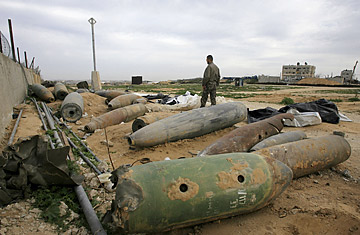
A Hamas security officer inspects remains of exploded Israeli ordinance on the border between Egypt and Rafah in the southern of Gaza Strip.
Rather than plunge headlong into the push for a comprehensive settlement, President Barack Obama limited his initial foray into the Israeli-Palestinian conflict to the more modest goal of consolidating a cease-fire in Gaza. Formalizing a truce based on an end to attacks by both side, halting weapons smuggling and opening the border crossings into Gaza was of "critical importance," Obama's envoy, Senator George Mitchell, said during his visit to the region last month. But Israel's cabinet had some bad news for the Administration on Wednesday: The truce is not Israel's priority, and it won't happen until Hamas agrees to a separate deal to release captive Israeli soldier Gilad Shalit.
The cabinet decision represents a last-minute shift in Israel's position that has angered Egypt — which has spent the past month painstakingly brokering the truce between the two parties that won't talk to each other — and raised the possibility of a new round of fighting. President Hosni Mubarak, who believed a truce agreement was imminent, was furious last weekend after being informed by Prime Minister Ehud Olmert of Israel's new stance. "Israel has withdrawn from its position," he said. "There was an agreement for a lull, and now the Israelis are going back a bit, but we are pressing them." Shalit's release, said Mubarak, is a separate matter currently being negotiated between Israel and Hamas on a parallel track, and will involve a prisoner exchange between Hamas and Israel. Hamas insists on maintaining that separation, and the Israelis appear to have previously accepted it — although Israel had previously indicated that it would only allow 70% of normal commercial traffic through the Gaza crossings until the prisoner exchange had been concluded. But Israel's decision to make Shalit's release a precondition for a truce may have been caused by domestic political factors.
Last week's inconclusive Israeli election did not produce a clear candidate for prime minister, but neither of the two contenders — current Foreign Minister Tzipi Livni, whose Kadima party finished first by a narrow margin, and her key rival, the Likud party's Benjamin Netanyahu — see a truce as Israel's best option. Livni has made clear that she sees Israel's 22-day pummeling of Gaza as having reestablished a "deterrent" to acts of violence by Hamas, and she prefers to avoid being bound by any truce in order to act again if Israel deems it necessary. Netanyahu has long made clear that he doesn't believe Israel can coexist in stability with a Hamas-ruled Gaza. And then there's the incumbent, Prime Minister Olmert, on the verge of leaving office in anticipation of a corruption indictment, who is widely seen in Israel as having waged two less-than-successful wars — the 2006 invasion of Lebanon, and the recent campaign in Gaza, both of which failed to deal a decisive blow to Israel's enemies. Olmert badly needs to produce a symbolic achievement from the campaign, and Shalit languishing in Hamas captivity after more than two and a half years is the most visible symbol of Olmert's failures. Making his release the precondition for a truce that Hamas needs is also making maximum use of Israel's leverage, the argument goes.
Still, the Israeli shift carries risks. For one thing, it will bring new diplomatic pressure on Israel. The cabinet decision has hurt Israel's relations with Egypt, whose cooperation is key to achieving Israel's goals in Gaza, particularly an end to weapons-smuggling. As Mubarak made clear, he will "press" Israel by lobbying the U.S. and Europe to insist that the Israelis stick to the original cease-fire script. Hamas, for its part, will use Mubarak's failure to deliver Israeli cooperation when Hamas had agreed on Israel's terms (through Egypt), to raise pressure in the Arab world on Cairo to open the Rafah crossing between Egypt and Gaza. The setback also weakens Egypt's ability to act as the sole mediator, which suits Hamas because of its own antagonistic relationship with the Egyptian leadership.
The fallout from the Israeli decision may not be confined to diplomacy, either. Hamas launched its rocket campaign last November in order to create a crisis that would force Israel to accept new truce terms, in which the priority for Hamas was reopening the crossings to end the economic strangulation of Gaza. It stands to achieve that goal under the terms of the truce being brokered with Israel, and if that agreement is now put on the back burner and the crossings remain closed to all but a trickle of humanitarian aid, the temptation for Hamas will be to provoke a new crisis by escalating rocket and mortar fire into southern Israel again. Sporadic rocket fire and Israeli air strikes continue, despite the Israelis having ended their major operation a month ago. Hamas, determined to lift the economic siege, could even see some political benefit from provoking the Israelis into striking heavily at Gaza again, knowing that this would only increase international pressure on Israel and Egypt.
Beset by multiple crises both at home and abroad, the last thing the Obama Administration needs is a renewed Israeli-Palestinian crisis. But a renewed crisis may be precisely what it will face if the current deadlock over a Gaza truce persists.
—With reporting by Aaron J. Klein/Tel Aviv and Jamil Hamad/Bethlehem
